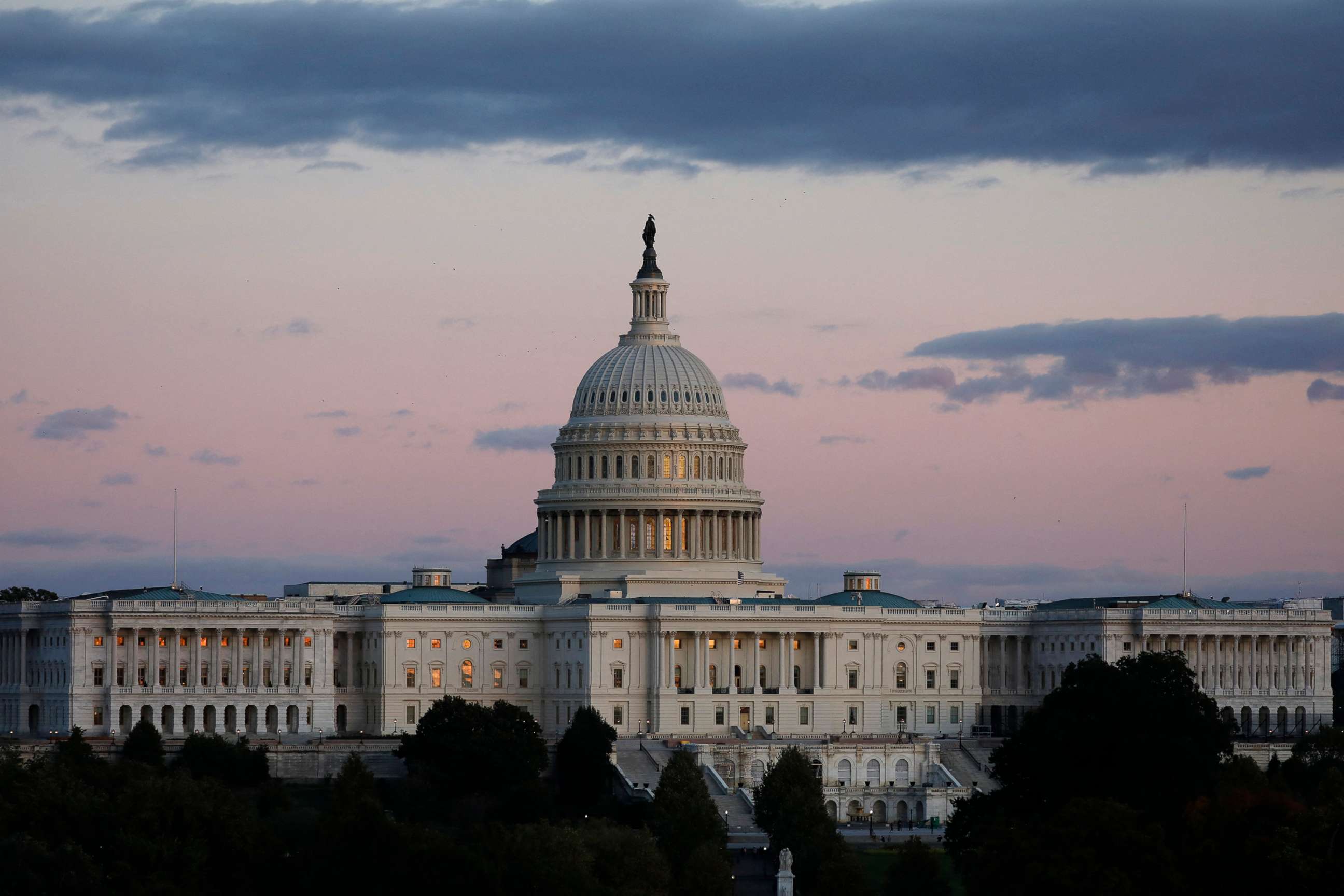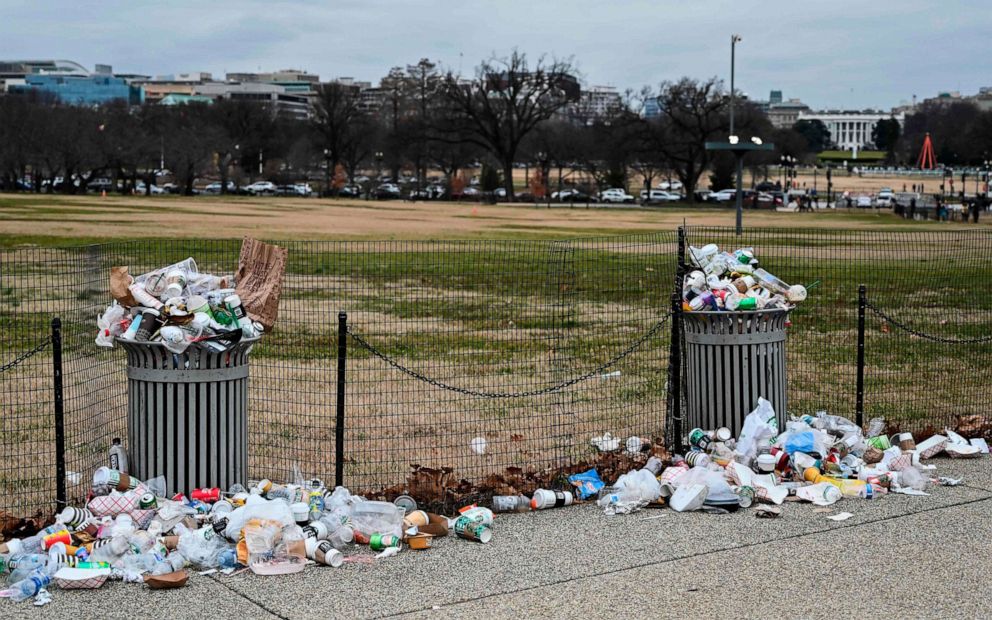Congress may be headed toward another government shutdown
There's little appetite for a shutdown among Republican and Democratic leaders.
As the nation’s capital is consumed by the Democrats' impeachment inquiry, President Donald Trump on Sunday signaled that he is not committed to keeping the federal government open later this month -- setting up another potential government shutdown ahead of the Thanksgiving holiday.
In response to a question asking the president whether he would commit to avoiding another shutdown like the one that roiled Washington almost one year ago, Trump refused to rule out the possibility.
"I wouldn’t commit to anything," Trump told reporters on the White House South Lawn on Sunday. "It depends on what the negotiations are."
With the House of Representatives in the midst of a 10-day recess, the House and Senate have just eight legislative days remaining where both chambers are in session to strike a deal to avert a government shutdown ahead of the Nov. 21 deadline.
Lawmakers must come to terms on 12 appropriations bills that fund all federal agencies, or pass another stop-gap continuing resolution -- maintaining current spending levels until they can agree to terms on any changes.
After little progress on bicameral negotiations leading up to the end of the fiscal year, Trump signed a short-term spending bill in September to buy lawmakers additional time to reconcile differences, especially on funding for the president's border wall, on Capitol Hill.
But that eight-week extension did little to reignite negotiations so it’s very likely Congress will need to pass another short-term bill before funding runs dry.

Last week, Senate Minority Leader Chuck Schumer said he was concerned that Trump would shut down the government over the impeachment inquiry.
"I believe left to our own devices Congress could work out an agreement to quickly fund the government," Schumer, D-N.Y., told reporters on Capitol Hill. "But I’m increasingly worried that President Trump may want to shut down the government again because of impeachment, an impeachment inquiry. He always wants to create diversions."
On Friday, the Senate passed a package of four of 12 appropriations bills in an 84-9 vote, funding the operations of major agencies such as Agriculture, Transportation and Interior.
But those are the only appropriations bills the Senate has been able to muster. Later in the day, Senate Democrats rejected a defense spending bill, objecting to $5 billion slated for the president’s desired border wall at the U.S.-Mexico border.
Senate Majority Leader Mitch McConnell was quick to criticize Democrats on the Senate floor last week over the move.
"There’s no small amount of irony associated with the fact the president is apparently being impeached over in the House for holding up aid to Ukraine and at the same time Democrats are going to filibuster the defense bill, which would provide for the assistance to Ukraine," McConnell, R-Ky., said last week.
McConnell and House Speaker Nancy Pelosi connected on the phone last week, when aides to the leaders say they agreed that they both want to finish the appropriations bills by the end of the year.
Senate Appropriations Committee Chairman Richard Shelby, R-Ala., pressed his colleagues to put partisan politics aside and support funding for U.S. troops on the ground in a floor speech last week.
"Our men and women in uniform should never find themselves on the battlefield wondering if they will be able to support their families back home. They should never wonder if their training needs, support requirements or mission objectives will be held hostage by partisan bickering. They should never wonder why America’s adversaries are doubling down on their military investments while America is sitting idle," Shelby said.

House Majority Leader Steny Hoyer told reporters he would like to see a continuing resolution fund government until Christmas.
Because Congress and the White House have already agreed to a caps deal, setting the spending levels for appropriations, the hold up now is about allocations -- how funding will be split between 12 subcommittees.
Those levels will be established through informal talks between the House and Senate's chairs and ranking members, who are trying to narrow differences in the coming days. Once that process is completed, appropriators would then negotiate individual bills.
One senior Democratic appropriations aide called the stalemate "a pretty significant roadblock" and said the key is the Homeland Security bill, where Senate Republicans want $5 billion diverted from the Labor and Health and Human Services budget to provide additional money for the president’s border wall.
Democrats don’t support that and their bill, which has only passed out of committee, does not include any new funds for the border wall. An aide said Democrats are open to increasing Homeland Security funding -- for Coast Guard ice breakers, for example -- but they insist any offsets cannot come from domestic programs in the Labor and HHS title.
"How we get out of it, I don’t know," the Democratic aide said. "But there’s a general commitment we’re not going to shut down."
If appropriators are able to make progress on allocations, the length of a continuing resolution would fund the government through mid-December.
But absent a breakthrough, the continuing resolution is likely to carry into next February, beyond the expected drama of the impeachment inquiry in the House and a potential trial in the Senate.
While the politics of impeachment rage, appropriators don’t see the political showdown impeding the appropriations negotiations. Lawmakers and senior aides on their staffs are considered "essential" personnel who are exempt from a shutdown.
The primary sticking point is still the border wall, and a continuing resolution would maintain restrictions preventing funds for the border wall.
“Republicans remain committed to fully funding the federal government, even in the midst of any other business the House or Senate may have to conduct. That includes passing another CR in the event that regular appropriations bills are not imminently achievable,” a Senate Republican appropriations aide told ABC News.
“The only thing that would hinder our ability to do that would be Democrat demands that the next CR contain wall-related provisions that the current CR does not,” the aide added.
While the record-long, 35-day partial government shutdown that dragged on from last December into late January garnered big headlines, a shutdown later this month would have a far stronger impact, more in tune with the 16-day shutdown of 2013 when the entire federal government shuttered and resulted in a $24 billion loss to the U.S. economy.
But even a full government shutdown, nevertheless, would not have an impact on the Democrats’ impeachment inquiry.
"It just makes everyone’s lives miserable," one Democratic aide said.

So far, the House has passed 10 of 12 bills through the lower chamber, while the Senate has only mustered four of 12 measures.
But there’s little appetite for a shutdown among Republican and Democratic leaders, and insiders believe McConnell has maximum leverage over President Trump in any appropriations matter due to his control of a potential impeachment trial in the Senate.
"Trump is inclined to listen to McConnell on how to handle Senate for impeachment, and he’d say a shutdown not helpful," a Democratic aide observed. "McConnell does not want a shutdown."
Republicans, meanwhile, are sounding the alarm that a continuing resolution would harm the U.S. military in the long-run, because the Pentagon would not receive funding that reflects its most-pressing priorities.
"Across the political spectrum, folks have rightfully praised our military and intelligence professionals for taking a barbaric terrorist off the battlefield this past week. But it would be wrong to praise them with our lips and damage them with our votes," Rep. Mac Thornberry, the House Armed Services Committee's top-ranked Republican, warned. "History teaches us that America will be tested in the coming weeks. Our men and women in uniform will have to face that challenge abroad while the support for their training, weapons and families remains uncertain here at home. We owe them more and we must do better."



